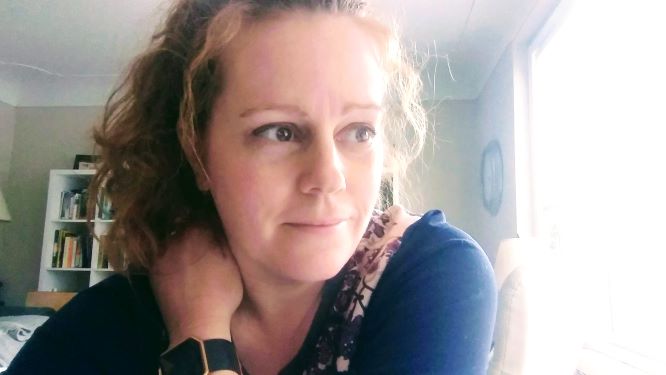
Grieving The Old Life
This week is Mental Health Awareness Week, so it’s a great opportunity to talk about our mental health and provide some resources to help us navigate through it. You can visit us on our Facebook Page or on the Mental Health Blog as well. I hope you join us this week!
As I’ve navigated through the journey of supporting my loved one who struggles with mental illness, there was one realization I had that impacted me the most…and it still does. Grieving.
It sounds a little odd – no one has passed away…so why would I grieve? For a long time, I would look at social media and see how my old friends were doing – the house, the kids, the family pictures….and I would get angry, or just sad. I held on for a long time to the ideal life I had dreamt about, but would no longer have, thanks to this new journey of navigating mental illness alongside my partner. I had to grieve the loss of that life I would no longer have due to the circumstances around his struggles.
There is no one right way to grieve. Grief is a very personal emotion, and we have to understand that there are no timelines and no instructions, so it’s okay to navigate the way that you feel is best.
We often look to the Five Stages of Grief, a model that was introduced by Elizabeth Kubler-Ross, a Swiss-American psychiatrist for those grieving the loss of a loved one, but can be applied to many experiences people deal with. I’m going to apply it to the grief I’ve mentioned above – an adjustment to a life with someone dealing with mental health struggles.
What are the Stages?
Denial: allows for the information or news to slowly be absorbed, or for you to adjust to it. It can also be seen as a defence mechanism. “This is just a temporary phase/issue.”
Anger: as we begin to let our emotions out and adjust to a new way of living, we often redirect it at people or even our loved one. “I’m so tired of dealing with their moods! Why can’t they just be normal? Why can’t they just be happy for one day?”
Bargaining: Because we want to cushion the blow of this new reality, we are often desperate to change it and so we cry out! “Maybe if I pray enough, God will cure my loved one and everything will be fine again.”
Depression: Our new reality starts to sink in, and we see how our life has changed and won’t be the same. “I’m sad that my life won’t look the way I had thought it would.”
Acceptance: This doesn’t mean that life is totally normal, and we won’t have bad days, but it does mean that we can accept that there is a new reality and start to move forward.
These stages might not all be done in this order. You may accept this new reality and be okay, and then have a day where you are angry or sad. And that’s OKAY! The Five Stages “give a vocabulary to much of what people deal with internally as they walk down the winding road that is grief” (Seth Troutt).
So What Do We Do?
Reach out. Talk. The worst thing I ever did was hide. The first time we experienced a crisis, I denied it was even happening. I pretended things were okay and just made it into a joke, obviously a defense mechanism (I tend to do this often). I avoided people and church. I encourage you to NOT do this, because I ended up just feeling very alone. We have a Mental Health page, designed to support both those struggling and those supporting loved ones who are struggling. Message us.
Write about it. Journal your thoughts down and don’t hold back on how you feel. If you are at that angry stage – I say, let ‘er rip! It feels good to write out how we feel. When it bottles up, it comes out…and it will usually come out onto an unsuspecting person. I was really angry for a long time and I did take it out on people, whether on my poor husband or even a stranger. And..let me tell you.. I could be very mean. So, talk to someone about your anger – someone you trust not to judge you, but who promises to listen and then pray with you.
Make A Plan. Find out what triggers your sadness or your anger. Is it the social media accounts you follow? Unfollow them. Is it a friend who is just not sensitive to what you are going through? Sometimes there are well meaning people, but when they start to bombard you with only advice or questions that make you feel overwhelmed, it’s okay not to confide in those people at the moment. Know who your advocates are so that as you work through these stages, you can find comfort and feel supported.
There are many people who struggle with mental illness and adjust to a new way of life successfully. For others, it goes in ebbs and flows. And for some..it can feel like an uphill battle every single day. Whatever journey you are on, whatever stage you might be working through, there is one comfort I want you to have – knowing that we have a God who listens and wants us to be at peace. He puts people in our way to help us alongside our journey, so don’t be shy. In this community – reach out to someone and ask for help.
Grief turns out to be not a state but a process.
Grief is like a winding road where any bend may reveal a totally new landscape.
(C.S. Lewis)

About the Author
Rachel Collins has been on staff with Compass Point since 2014 as the Communications Coordinator in our main office.
She has journeyed alongside her husband who was diagnosed with Bipolar Disorder. Even though the journey has had a few detours, and tough moments, it has led her to return to school to earn her BA in Psychology.
Follow Our Compass Point Mental Health Page
Related Posts
Related
Summer Bucket List
Top Ten Book SuggestionsIn summer we often have more time to relax with a good book. These recommendations come from other Compass Point women—consider checking out one or two that whet your appetite. Perhaps you’d even like to pick something to read with a friend or...
Fill My Cup Lord
Do you ever feel that if you hear the words COVID or global pandemic one more time you would scream? My question today is this, how do we cope? How do we fill our cup when we are running on empty? There is an old chorus that speaks into what I wish to share. Fill...
A Golden Opportunity
What golden opportunities are available to us during these hard and dark days of a global pandemic? How do we even escape the feeling of isolation? This feeling is not only limited to the physical but also can lead to mental and emotional pain. How do we get out...

